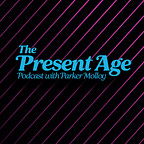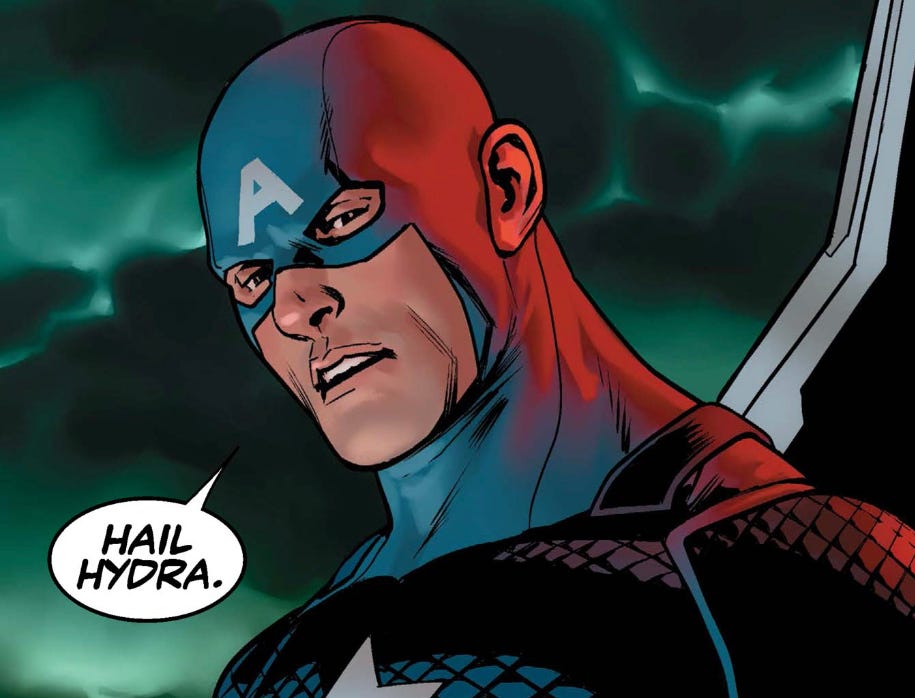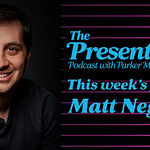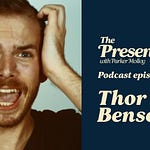Parker Molloy: Welcome to the first episode of the Present Age Podcast. I am your host Parker Molloy.
Comic book fans may know today’s guest from his work writing The Amazing Spider-Man, She-Hulk, Silver Surfer, Iron Man, and most recently, the Fantastic Four.
His name is Dan Slott, and our conversation starts right now.
Dan Slott, thank you so much for talking to me. I appreciate it. Thank you!
Dan Slott: Oh, thanks for having me on, Parker!
…
One of the things I'm trying to do with this new venture of mine, this new newsletter/podcast/whatever is this idea that ... Just looking at communication. The various ways we communicate with each other, and I've really been enjoying being able to talk to a wide variety of people, doing different things, and especially coming out of the pandemic, it's just been really interesting.
One of my previous interviews was with Will Butler, who plays in the band Arcade Fire, and it's been really interesting. They're used to playing in front of tens of thousands of people and then suddenly the pandemic hits and it's like, "Oh, yeah, it's a bad idea to get in a room with more than five people." Which is fewer than are in their band. I wanted to talk to you because you have a really interesting career that I've appreciated from both afar and up close.
For people who didn't bother to listen to my intro on this, Dan writes comics. You've written a ton of stuff, but it's probably safe to say that for most people who are familiar with your work, they're probably most familiar with your decade-long run of Amazing Spider-Man. Would you say that's correct?
Yeah. Most people who know me ... It's weird because I've had a career that's had ... I've had the benefit of having multiple runs at this where people forget what I did before. Then I come in all fresh-faced. For a long time, I used to be the Ren and Stimpy guy, then I became the She-Hulk guy. Now people still think of me as the Spider-Man guy because once I got that, that was my dream gig, whenever ... It's kind of neat.
Once you become a Spider-Man writer, all the other Spider-Man writers, it's almost like a fraternity. They'll reach out and they'll talk to you, like, "How are you doing? Are you doing okay?" I killed Peter Parker and replaced his brain with Doc Oc's is one of the ways most people know me.

For better or for worse people had very, very strong opinions about that.
Yes. To the point where Marvel literally hired bodyguards.
Seriously?
Yeah. For one signing and another signing the NYPD provided them.
That is nuts.
Yeah. I was brought into a meeting with the NYPD, the DA's office, the NYPD cybercrime division just for all the death threats that we got once we killed Peter Parker.
Wow. That-
Yeah. It was on the crawl on CNN and I had to tell my dad to make sure my mom didn't watch CNN that day.
Oh, man. That's wild and that's ... Geez. I had no idea it got that bad, but I'm glad that that seems to have mostly passed.
It dissipated like within two weeks once the next issue came out. The first issue of Superior Spider-Man with Doc Oc in Spidey's brain, and at the end of the issue, spoilers, you see that Peter Parker's ghost is there. All the readers went, "Ah." They could see there was some kind of connected bridge, some way back that maybe Peter Parker could get his body back.
Then they were like, "Okay. Okay. We're ..." Once people could see the puzzle pieces in place. For them, grown men were like, "You killed Peter Parker."
How could you?
That's when the nice ... One of the nice things that came out of that, like I said before, is Gerry Conway, a long-time writer of Spider-Man, reached out to me when all that was going down and he was all ... He's the one who killed Gwen Stacy, Spider-man's long-time girlfriend at the hands of the Green Goblin. It was the first major death since Captain Stacy and Uncle Ben. Gerry said to me ... And it was the first time we'd met, was him reaching out to go like, "Are you okay
He said, "You know what makes you different from every other Spider-Man writer?" I'm like, "No, Gerry Conway."
Do tell.
This is the guy who was writing Spider-man when I was growing up. I was like, "Oh my God." He went, "You're the writer of Spider-Man during the age of social media." You're like, "Aha." He's like, "If I had killed Gwen Stacy and there had been Twitter and Facebook around, I would have been killed."
Oh, I can't even imagine. That would just be ridiculous. That I think is one of the things that has really interested me about talking to you on this, is that yes, it is the age of social media. It is the age where people have direct access to pretty much anyone on the planet. I mean, I try to think about what it would be like growing up and being in my teens and being able to just connect with literally any person on the planet, favorite musicians, least favorite musicians, politicians, and anything.
It's fantastic, but it's also terrifying at the same time. I think that when it comes to higher-profile people, especially when you're making these decisions that ... Obviously you can't please everyone with every issue of every story that you write. Obviously, they're going to voice their opinions back to you. What is one thing you love about social media and what is one thing you hate about social media? That's the question.
I'm sure you do this too. You throw out some kind of thing to a celebrity you like, and then they like it, or they answer it or they retweet it and then you get that rush, that sugar rush and oh my God. Admit it. You've screencapped it, haven't you?
Oh, yeah. Absolutely.
You go, "Oh my God, this famous director answered my tweet in real time or this celebrity that I care about." I am huge Whovian. I am a Dr. Who nerd to the nth degree. One of the bizarro things that happened because you and I, we're those awful human beings who have blue checks.
Oh, the dreaded blue checks.
The blue check. Something happens when you're a blue check and you throw a comment to another blue check. It almost gives you a little bit of validity and they'll look at it. You're like, "Ah." Also, other people will start watching this conversation you're having in real-time. Karen Gillan, who is Amy Pond and Nebula, and in Jumanji too, she was mentioning how she couldn't wait to get back to Scotland and have chips with chippy sauce.
I wrote, "For American fans, what's chippy sauce?" Then she started describing it. We were having a brief conversation about chippy sauce, and suddenly it's in the newspaper the next day in British media, "American fans confused by chippy sauce." There is suddenly my tweet in an actual newspaper talking, "What is going on?"
Yeah. It's always funny when something I tweet ends up in ... If a reporter calls me and says, "Hey, can I get a comment on whatever?" I'll sit there and I'll think it through and then I'll be like, "Okay. Yes, here's my statement." A lot of times it's just something I tweeted not really thinking about anything and it'll just be in the paper. The way that it's worded a lot of times will just be pretty much the same. It'll still be like-
Horrible.
... like it's just a quote from me, you know? It's usually fine, but sometimes it's a little embarrassing.
I have to be super careful. I praised the Shazam
movie and then suddenly Shazam social media is reaching out like, "We would like to use this on a poster." I'm like, "No." I'm a Marvel exclusive guy. I can't have someone at Marvel see my tweet praising Shazam on a poster for God's sake. That'll bring trouble.
See, that's the thing. It takes something that should be no big deal to just be like, "Hey, I really like this thing, or I didn't care for this thing." Either way, it should just be something that's small, but social media has this weird way of flattening everything to the point where, whether it was a big comment, little comment, something you thought about for weeks or something that just popped into your head, it's all treated the same and we're in this world where everyone is.
You know the Plinko game?
Yeah.
Where the ball goes down [inaudible], whatever your comment is, however nuanced it is, wherever it dropped on the Plinko, at the end of the day, there's black and white, there's yes and no. Someone will take your very nuanced threading a concept tweet and make it into, "You believe this or you support that." When you're like, "I was threading this." To this day, this is a decades-old problem.
Or you could have a situation where there was a writer, Nick Spencer who did a controversial story where Captain America, Steve Rogers, was revealed to be an agent of Hydra through comic book machinations that Cosmic Cube had rewritten it so he was now always a Hydra agent. There were two Captain America comic books coming out at that time, both written by Nick Spencer.
The Present Age is a reader-supported newsletter. While a free version of the newsletter exists, paid subscriptions make this work possible.
One featured a blonde-haired blue-eyed, Steve Rogers, who is now secretly an agent of Hydra. The other featured Sam Wilson, an African-American superhero, who was also calling himself Captain America. These were clearly two books of one piece taking on two different sides of arguments and everything boiled down to everyone wouldn't even talk about the Sam Wilson Captain America comic. These were sister comics.
They would only talk about that and how dare you turn Captain America into something that looks and feels like a Nazi? How dare you? That became the conversation. That's the conversation Twitter wanted and that's the conversation it got. It will always go to the thing that is the most hot-button, the most reactionary. No one wants a well-thought-out nuanced conversation. That's not what social media is for.
Yeah. Well, exactly. I mean, that's one thing that I always find really interesting in the way that social media, which is this very instant gratification kind of setup, will respond to things as far as comics are concerned, because in that case you had Twitter freaking out and it turned into, "Oh, well, Nick Spencer's trying to turn Captain America into a Nazi and all this."
I mean, have people read comics before? I mean, if all of these characters are around for decades and decades and decades, you need to have some kind of out-there storylines to keep it going in different directions. Generally speaking, you're not going to ... How weird would that have been, had it been like, "Yes. No. Captain America is a Nazi. That's how it is now going forward." It's like, that is not ... Anyone who's paid attention to comics should know what's happening.
What it is, is everyone wants the theater of it. Everyone wants to be part of the conversation and things like trending topics mean that suddenly if you're having an argument and things are boiling down to black and white and things are boiling down to ... then it means all these people that aren't familiar, let's say with comics, suddenly jump into the conversation as well, because all they're hearing, like if we use that example, is Captain America's a Nazi.
What was Marvel thinking? Now someone's jumping in with that and we get to see over time that someone who's got skin in the game where you see a Russian troll farm will gin up a topic in the middle of ... 3:00 in the morning suddenly everyone cares about Hunter Biden's laptop at 3:00 in the morning.
Just like, "Oh." Yeah.
Or everyone cares about this, that, or the other at 3:00 AM and it's because people now found a way to manipulate the game.
Yeah. Right now there's this push in some states to fight back against what the people fighting are calling critical race theory. It's just this culture war nonsense basically that is being waged by some extremely online figures. There's this guy named James Lindsay, who's one of the big anti-critical race theory dudes. He tweeted, he posted a link to a headline that said, "Marvel reveals Steve Rogers no longer believes in the American dream in first issue of whatever."
What?
He responds, "Abolish Marvel." That was sent yesterday. Then all the other replies to his are, "Steve Rogers standing for nothing but nihilism is a sad commentary on the woke movement. The left went after entertainment so they could pervert your children's thoughts and destroy your childhood heroes. We are in the propaganda phase of a war. Pay attention and confront this before it's too late.
Then ... Yeah. That's it, I'm done with woke Marvel, only the old stuff for me from now on. Everything they've put out post-awokening can go straight in the trash as far as I'm concerned." Now, that is a very tell me you've never read a Captain America comic without telling-
Ever.
... me you've never read a Captain America comic, you know? It's like-
Yeah. We can point to everything from the whole Nomad era of Cap, which was the Captain America books that came shortly after Watergate, where he refused to wear the flag. He did it again for a while when the character that a lot of people have now met through Falcon Winter Soldier U.S. Agent became Captain America. Once again, Captain America threw off the costume and wore this black costume to show that he wasn't supporting certain beliefs.
You can look at comic book writers that are very right-wing, like Frank Miller. When he did Daredevil Born Again with Captain America in it, you clearly saw that was a Captain America that stands more for the dream and the ideology than the flag. A lot of this is something will boil up in comic Twitter and it'll make it over to regular Twitter where someone can take it and grab it and run with it. Like when they said Ta-Nehisi Coates is going to write the Superman movie.
Suddenly everyone's looking for a fight and it's got to boil down to good or bad. It's got to boil down to I'm against it or I'm for it and there's really no room for conversation. You're going to have a far more fun time on Twitter if you just watch the funny animal videos.
Yeah. One thing I've tried to do more of is knowing what I don't know. That is an important skill I think, is to know when you don't know enough to weigh in. That's something that it's like ... I struggled with for a while. It was, I would be like, "No, I think I should give my opinion on this." Then whatever it is, and you see that happen every day.
A story will come out about wildlife and suddenly everyone's like, "Well, when an animal is cornered, it does this." Everyone becomes an expert in every single issue that happens. Yeah.
Oh, God. I love how much legal expertise everyone has online. Everyone online has gone to law school. In the same way that everyone's a doctor because they can go to WebMD. It's kind of scary. One of the things that's happening a lot in my industry is NFTs and whenever someone comes to me and goes, "What's your opinion?" I'm like Marvin in the back of the car Pulp Fiction. I am like, "I know nothing of this subject. I am not even going to research it. I'm not even going to look into it. It can be all the way over there and I'm out. I am not for or against. All I know is my ignorance."
Yeah. I mean, the internet makes it so much easier to connect with others, but one thing I've been thinking about is just that maybe we're not meant to be so connected with others. I'm not meant to know the opinion of a hundred thousand people all at once.
You can't unring the bell, but if you say something wrong in a newspaper, your newspaper can get sued. There are certain guard rails, there're certain things that are out there and the internet feels far more Wild Wild West. It also feels far more vigilante where you get that case where this woman, before she goes on a plane, makes a terrible racist joke and by the time the plane lands, that joke has trended. She's been fired from her job. People are waiting to see her as she comes off the plane with signs mocking her.
Did she deserve it? I don't know. Probably yes, but then it's also weird. It's all so Wild Wild West. Like Chris Cooper and that woman in the park with the bird. Comics Twitter is way more into that because a lot of us know Chris Cooper because he started off in comics. He's edited comics I wrote in the '90s. We were horrified, and then he didn't press charges and no charges were pressed. Now suddenly she was doing that thing again and we're all like, "Oh, there should have been consequences."
During when it was happening, everyone was ready to find this woman and burn her at the stake. Then there were people being all, "Let's not be a mob." Now she's out doing the same thing again with no repercussions. We're like, "Oh, we should have." I don't know.
That's kind of ... The issue is that I don't think that there are clear correct answers to how to respond to things happening in the world. One thing that I've been finding extremely odd, especially from the world of news media, is this idea that the HR decisions of every company should be up to a public vote, which it's like someone gets pushed out at a company because they wrote some bad columns or something and then you have half the internet going, "How do they justify this?"
That sort of thing, but when you think about it, it's like people get fired every day for no reason at all. Sometimes it's just, "Hey, we're tired of you." That sort of thing. I mean, I've been laid off from jobs before, and that seems to be something that people insert themselves into on this really wide scale when it comes to social media.
Yeah. We just saw like four years of an administration where if certain people in certain positions acted that way at a company, they would be fired. They were able to use social media as a way to bolster their power and to go, "We are untouchable because look at all these Twitter followers we have. Look at this public opinion." You'd have people on the news talking about the reaction on Twitter, which is something that can't be regulated, which is something that can be abused, which is something that can have a troll farm in Russia create 80 million tweets overnight or people ... You know what I mean?
Yeah.
Yet there're some people like that guy who created the whole Pizzagate scandal, he's still online. He's still someone that people retweet and talk about and use as a source. I'm like, "Shouldn't that guy have been ridden out of town on a rail? Shouldn't have no soapbox for the rest of his life? You created and propagated Pizzagate, and yet you still have a platform. How does that work?"
It's just so, so bizarre to watch that happen. A month or two ago, I was speaking with Michael Hobbes. He hosts a podcast called You're Wrong About. I love that podcast. It's great and highly recommended. He was talking to me about how some of the most popular episodes of that podcast have gotten a million downloads, which is great. He was trying to think of this. Like if you get a thousand emails all at once, it's going to feel like the world is crashing down on you.
It's going to feel like everyone on the planet is laser-focused on you. You might be trending or something like that even, but he put it this way. He's like, "Okay. Imagine one of those episodes that got a million downloads, if a thousand people are extremely angry and they all email you about it and they all start yelling at you online about it, that's 1%. That's not a majority."
It's not a ... Or actually, no, that's one-10th of 1% now that I think about it. It's important to put these things in perspective. I think that one thing that social media does is it really flattens that perspective, which is very unfortunate. It makes taking risks and being creative and all of that more difficult.
I'm curious. Have you ever pulled punches in your writing? Have you ever held back because you're like, "I don't want to deal with whatever the fallout from this idea that I have in my head is."
Like on a tweet?
No. No. Like in your work?
In my work?
Yeah.
Yeah. No. Of course.
Yeah. Yeah. I mean, we all self-censor in various ways, but-
I also have the benefit of having an editor-
Yes. Editors are important.
... who will go, "You are not doing that. You are not telling that story." One of the issues of Spider-Man that I pitched ... And I wrote like over 200 issues of Spider-Man so you're always throwing out ideas. One of them, there's a Spider-Man villain, Swarm, who was this Nazi scientist, von Meyer, who he had done stuff with killer bees and they became a part of him. He became a living swarm of killer bees with his skeletal remains in the middle, but that's it.
He's like a walking pile of killer bees. He would always attack Spider-Man fireman by firing killer bees at him, or turning the killer bees into a giant hammer and hitting him with a hammer made of killer bees. Every swarm story was the same swarm story. He fires bees at you. I go, "I have an idea. I want to do a Swarm story. I know a new way of doing a Swarm story." The editor is like, "What is it?" I go, "We've never seen what's happened to the honey."
He goes, "What?" I'm like, "Yeah. He'd be selling the honey at farmer's market and stuff in disguise in a beekeeper suit or something. Everyone who eats the honey, since they're honey made of Nazi bees, become Nazis." They're like, "You want to tell a story about Nazi honey?" I'm like, "Yes. I think this will be really interesting."
I'm like, "We'd call it Nazi gold." They're like, "You are never telling that story. You are never telling the story of Nazi honey. We will stop you."
It's nice to have someone to tell you no.
Yeah. I mean, that's the thing. It's one of those things that, would it have been interesting? Absolutely. Would people have been like, "Oh, look at this. He's writing a story where they're making Nazi ... where honey turns people into Nazis. What does he have against honey? What does he have against-
Yeah. That and a story where Spider-Man was fighting Yakuza or the mob or somebody in a hotel where there was a drop for drugs or blood diamonds or whatever, the Pulp Fiction briefcase. Elsewhere in the hotel was a furry convention. This guy was going to his first furry convention and he was hiding the fact that he was a furry from his family. At one point the police and all these people burst in because they're going after the mob and the guys that Spider-Man are fighting.
The guy from the furry convention go, "Oh, my God, I don't want to get caught." He goes running and he ends up in the room with all the mobsters, but it's the Marvel Universe and it's a guy in a giant animal suit so they assume he's a super villain. They go, "Oh, are you the super villain we sent for?" He goes, "Yes, I am."
He ends up dragged along in the story as the weasel, and by the end of the story, he has unintentionally become Spider-Man's worst enemy through no means of his own, where he'll have his hand on the giant lever that's going to lower Spider-Man into the pit and Spider-Man's like, "You'll never get away with this, weasel." He's like, "I know. I don't want to be doing this." I thought it was this really funny story.
My editor goes, "You're pitching us a Spider-Man story with furries?" I'm like, "Yeah." They're like, "You are never telling that story. We will stop you. You can't tell that story." When you wake up in the morning and you go, "Thank you, Marvel. Thank you for not letting me ... I have now slept on it and yeah, that ... No, no. I shouldn't. No, thank you for stopping me."
See, I think that would be interesting.
This is what people say!
I mean, for some reason, I don't know why, but that reminded me of ... There's ... What's that character who was an old human torch villain who was ... Asbestos Man. That was it.
Asbestos Man.
He made a comeback decades after he was first written. That was basically he shows up and he's just like, "I'm Asbestos Man." Everyone's like, "No, stay back, stay back." They're afraid of him but for the wrong reasons, because he's-
When I was writing She-Hulk, it was all like her as a lawyer dealing with superhero problems. I so wanted to do the Asbestos Man case, where, you know, like ... Yeah.
Yeah. Asbestos Man lawsuits?
Yeah. Exactly. I wanted to do Asbestos Man lawsuits. Yeah. There was stuff I didn't do in She-Hulk for that same reason that people are like "Don't go near there." I was going to do a story of one of the ... She works in a law firm and they deal with superhero cases, like can a ghost testify at their own murder trial? Things that would only happen in a superhero world.
I had a story where one of the lawyers in her firm, their high school biology teacher was getting fired for teaching Marvel creationism. Everything he was teaching his students is stuff that you can see in Marvel comics, like Odin coming down from the world tree and the Eternals and the aliens creating the Inhumans and the Deviants.
You're like, "We've been having this stuff, this mythology in our comics for years, and to have someone get fired because they were teaching it in a science class." I thought this was really funny. They're like, "Oh, let's not go near this. Let's not. No. Let's not poke that bear with a stick."
Dan Slott supports creationism. That's the takeaway.
You know the Watcher, right?
Yeah.
Yeah. They were going to bring the Watcher on the stand in that case and the Watcher was going to go, "Everything he said is true."
Well, Dan, thank you so much for talking to me. This has been a lot of fun. What can people check out that you're working on right now?
Any issue of the Fantastic Four that's on the stands.
Please check out the FF. We're in the 60th anniversary year, we're telling big stories. We're taking big swings to honor the legacy of Stan and Jack, who would tell the craziest stories in the Marvel Universe in the FF.

















